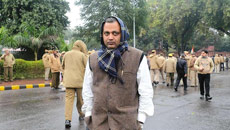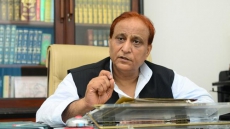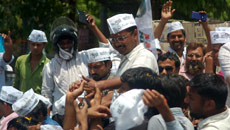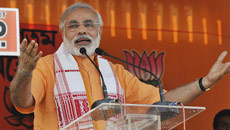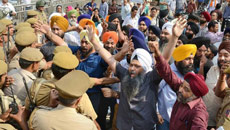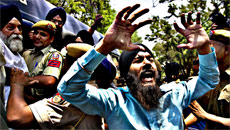The Supreme Court Friday said that the seven conspirators in the 1991 Rajiv Gandhi assassination will not be released for now, a ruling that left the mother of one of the convicts disappointed.
The apex court referred to the constitution bench the larger question whether the government can free a convict whose death sentence has been commuted to life term.
A bench of Chief Justice P.Sathasivam, Justice Ranjan Gogoi and Justice N.V.Ramana said that "all the interim orders granted earlier will continue" till a final decision is taken by the constitution bench.
The court ruling came on the plea of the central government which challenged the Tamil Nadu government's decision to free the seven convicts whose death sentences were commuted by the apex court into life terms on grounds of inordinate delay in deciding their mercy petitions.
Disappointed over the delay in the release of her son A.G. Perarivalan convicted in the Rajiv Gandhi assassination case, Arputhammal hoped the legal process would not take more than three months.
Arputhammal told reporters in Chennai that she had been making arrangements to receive Perarivalan alais Arivu from the Vellore Jail but was now at loss of words to express herself.
She said the apex court's decision was unexpected but she would continue her fight against the death sentence.
Former prime minister Rajiv Gandhi was assassinated in 1991 at Sriperumbudur in Tamil Nadu during an election rally.
Extending its order restraining the state government from releasing these convicts, the apex court framed several questions to be addressed by the constitution bench. These included whether after commutation of the death sentence into life imprisonment either by the president, governor or the court, the government can go further to grant them remission of sentences and free them.
While framing this question, the court referred to the conflicting positions taken by the central and the Tamil Nadu governments on this issue.
Citing this point, Chief Justice Sathasivam said: "The issue of such a nature has been raised for the first time in this court, which has wide ramification in determining the scope of application of power of remission by the executive - both the centre and the state."
The court also said that the constitution bench will also address which is the appropriate government -- state or the centre, or both -- to exercise this power to suspend or remit sentences under relevant section of the Code of Criminal Procedure (Cr.P.C).
The court framed six more questions to be adjudicated, which included whether life imprisonment means imprisonment for the rest of the convict's life or whether a convict undergoing life imprisonment has a right to claim remission.
Coupled with this, the constitution bench was asked to decide whether there could be a special category wherein after commutation of death penalty, such a convict is put beyond the applicability of remission of sentence and would remain behind bars in excess of a life term of 14 years.
"All the issues raised in the given case are of utmost critical concern for the whole of the country, as the decision on these issues will determine the procedure for awarding sentences in the criminal justice system," the court said.
It directed the listing of the central government's plea before the constitution bench as early as possible - preferably within three months.
The apex court Feb 20 blocked the release of the seven convicts in the Rajiv Gandhi assassination case and asked the Tamil Nadu government not to go ahead with its decision to release them.
The day after the court commuted the death sentence of the three conspirators - V. Sriharan alias Murugan, A.G. Perarivalan alias Arivu and T. Suthendraraja alias Santhan - to life imprisonment on the grounds of inordinate delay of 11 years in deciding their mercy petitions by the president, the state government Feb 19 decided to grant them remission and release all the seven convicts undergoing jail term.
Besides Murugan, Perarivalan and Suthendraraja alias Santhan, the other four who were sought to be released included Jayakumar, Nalini, Robert Payas and Ravichandran.
